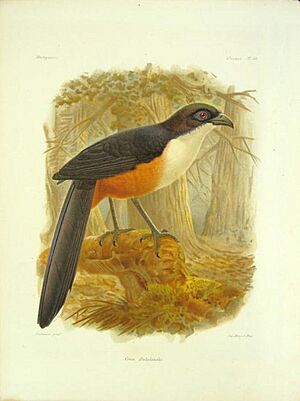Snail-eating coua facts for kids
Quick facts for kids Delalande's coua |
|
|---|---|
| Conservation status | |
| Scientific classification | |
| Genus: |
Coua
|
| Species: |
delalandei
|
| Synonyms | |
|
Coccycus delalandei Temminck, 1827 |
|
The Delalande's coua (Coua delalandei) was a special type of cuckoo bird. It lived only on the island of Madagascar. This bird is now extinct, meaning it no longer exists. People also called it the snail-eating coua because it loved to eat land snails.
Scientists only knew about this bird for a short time in the early 1800s. Most records show it lived on a small island called Nosy Boraha, which is off the coast of Madagascar. Some thought it lived on the mainland too, but most evidence points to Nosy Boraha.
Contents
Why Did Delalande's Coua Disappear?
The Delalande's coua was a very striking bird. It was the second-largest type of coua. Because it looked so unique, many people wanted to collect it for museums.
Scientists know of 14 specimens of this bird today. Most of these were collected between 1827 and 1834. A surgeon and naturalist named Chevalier Joseph Alphonse Bernier collected many of them.
Loss of Home: Deforestation
The main reason the Delalande's coua likely disappeared was the loss of its home. This bird lived in the coastal rainforests on Nosy Boraha. During the 1800s, much of this forest was cut down. This is called deforestation. When their habitat was destroyed, the birds had nowhere to live or find food.
New Animals: A Big Problem
Other animals brought to the island also caused problems.
- Black rats: These rats were likely on Nosy Boraha as early as the 1700s. They probably competed with the couas for food, like snails.
- Cats: Cats were probably brought to the island later, in the 1800s. Cats are hunters, and they would have hunted the couas, which made it harder for the birds to survive.
Searching for the Bird
There were some stories that people on the mainland were still hunting these birds in the 1920s. They used the bird's colorful feathers for decoration. However, these stories were probably mistaken. They were likely talking about a different bird, the blue coua.
By 1932, people offered a lot of money to find Delalande's coua. But even expert animal dealers in Antananarivo could not find any. This showed that the bird was truly gone.
The Delalande's coua had a unique color pattern. This suggests it might have only lived on Nosy Boraha. Its special look probably developed because it was isolated on that island. Any specimens said to be from "Tamatave" (a port city) likely just meant that was where they were shipped from.



